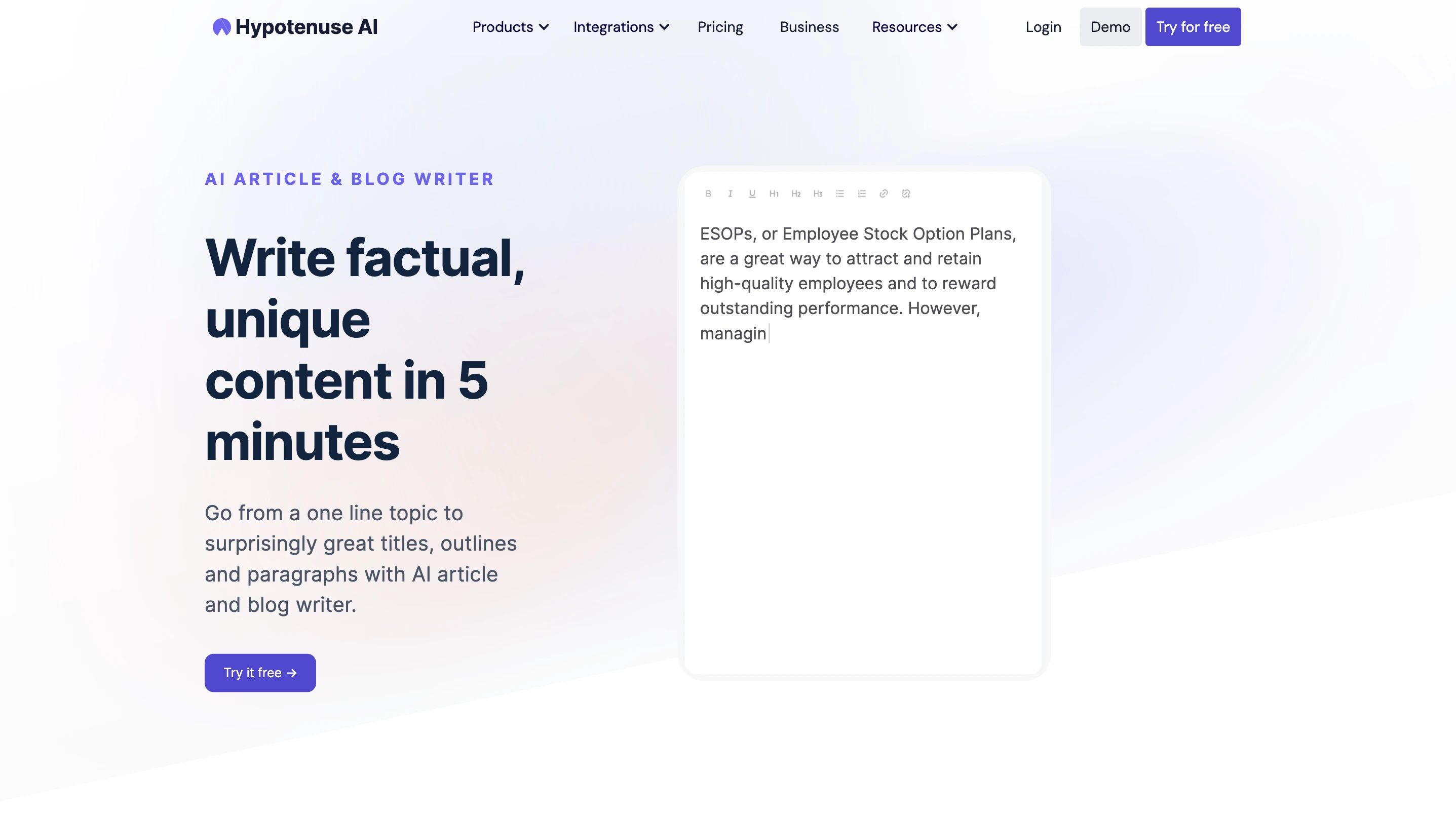From blog posts to social media updates, content comes in many forms these days. In this post, we'll explore the top 10 content writing styles so you can get familiar with the options.
Whether you're looking to start content writing or just want to learn more about the field, you'll get an overview of the main content types and examples of each.
What Is Content Writing?
Content writing is the practice of creating written materials for various purposes. As a content writer, your job is to communicate information through the written word in an engaging and accessible way.
Why Is Content Writing Important for Businesses and Marketers?
Content writing helps businesses engage with customers, explain products and services, establish credibility, and build trust. Well-written content can attract new customers, educate existing customers, and humanize a brand.
Creating high-quality, valuable content is crucial for any business or marketer looking to engage an audience and drive results. It's one of the most valuable tools in any successful marketing strategy today.
10 Types of Content Writing
Content writing comes in many forms and here are 10 common types.
Blog Articles
Blog articles are short pieces of written content published on a website or blog. They are usually between 500 to 2,500 words and cover a specific topic related to the site's niche.
Blog posts allow businesses and individuals to establish themselves as thought leaders, build an audience, and drive traffic. To streamline your content creation process, use Hypotenuse AI's blog writer.

Copywriting
Copywriting involves writing copy for advertising, websites, social media, emails, products, and more. It aims to persuade and motivate an audience to take a desired action, such as making a purchase or signing up for a service.
Copywriters need to have a good grasp of language, marketing strategies, and audience psychology to craft compelling copy.
SEO Writing
SEO writing involves creating content that is optimized to rank well in search engine results. This means using relevant keywords, staying concise, and understanding what searchers are looking for.
By writing with SEO in mind, you can help a website or piece of content gain visibility and organic traffic from search engines like Google.
Social Media Posts
Social media posts are written content published on social media platforms like Facebook, Instagram, Twitter, and LinkedIn. They provide updates about a business's products, services, industry news, and company culture.
Social media posts aim to engage the business's target audience and drive interaction through likes, comments, and shares.
Scripts
Scriptwriting involves writing scripts for movies, television shows, plays, and other performances. It requires crafting compelling stories, developing complex characters, and writing vivid and engaging dialogue.
Scriptwriters need strong creative writing skills, an understanding of story structure, and knowledge of film and television production.
Technical Writing
Technical writing involves creating technical documentation for products, software, machines, and processes. Technical writers must have strong research, writing, and communication skills, and an aptitude for understanding technical subjects. Sample types of technical writing include:
- User manuals: Instructions to help users operate products and software. User manuals explain how to perform tasks in simple, step-by-step language with illustrations and screenshots.
- Case studies: Reports that document an organization's experience using a product or service. Case studies highlight benefits, outcomes, lessons learned and recommendations to demonstrate value to potential customers.
- API documentation: Descriptions of programming interfaces and code libraries to teach developers how to integrate an application with external systems.
- Whitepapers: Provide in-depth analysis of a topic and are aimed at educating readers and influencing their opinions. They typically include research, data, case studies, and recommendations.
- Reports: Present findings from research studies, case studies, surveys and analyses. They summarize key insights, trends, conclusions, and recommendations in an organized format.
Email Marketing
Email marketing refers to content writing for emails sent to subscribers and customers. Emails promote products, services, events, and other content from a company.
Email marketing aims to drive revenue through sales, leads, and customer engagement. Emails should be concise, informative, and provide value to the reader. To efficiently craft such emails, you can try using our email generator.
Ghostwriting
Ghostwriting involves writing content that is attributed to another person. Ghostwriters produce books, articles, blog posts, speeches, and other texts that are officially credited to a celebrity, executive, or other client.
Ghostwriting is common in autobiographies, memoirs, self-help books, and other projects where the credited author lacks the time or writing skills to produce the work themselves.
Press Releases
Press releases are written announcements distributed by companies to inform journalists and the public about news. They aim to generate media coverage and public awareness of a product, service, event, personnel change, or other news.
Effective press releases have a strong hook, include all relevant details in the first few paragraphs, and provide contact information for the media to follow up.
Creative Writing
Creative writing involves using the imagination to produce original works of fiction or poetry. It allows writers to explore their creativity and self-expression through storytelling and crafting of language.
Creative writing is one of the most enjoyable types of content writing as it gives writers the freedom to invent characters, plots, and settings limited only by their creativity and imagination.
How to Become a Content Writer

Content writing is an exciting and rewarding career. If you’re looking to dive into it, here are some good tips to follow.
Learn the Fundamentals
First, educate yourself on what good content writing entails. Read books and blogs to learn about different writing techniques. Study how successful writers are in your niche. Gain a solid understanding of grammar, spelling, punctuation, and style guides. Hone your research skills to find credible sources for your writing.
Choose Your Niche
Next, identify one or two content niches you want to specialize in. For example, you might focus on technology, health and wellness, business, or travel content. Having a niche gives you more depth and helps you build a stronger expertise—that way, you gain trust with brands in the same industry. But don't limit yourself—branch out over time.
Build Your Portfolio
Start creating writing samples in your niche to include in your portfolio. Having published clips, whether on a blog, website, or publication, is essential for landing clients. Make sure to showcase different content types like blog posts, white papers, social media posts, and more. Quality trumps quantity here.
Learn New Skills
Continue expanding your skills through courses, reputable websites and even YouTube. Consider learning complementary skills like SEO copywriting, graphic design basics, and CMS platforms like WordPress. The more well-rounded you are, the more opportunities will open up.
Network and Build Connections
Put yourself out there! Attend industry events, join professional organizations, and connect with professionals on LinkedIn. Let people know you are available for hire and actively seek out content writing jobs. Sites like Upwork are great for finding remote gigs.
With hard work and dedication, you can build an amazing career in content writing.
What Skills Does a Content Writer Need?
A successful content writer needs a diverse set of skills to create compelling copy that engages readers. Here are some of the most important abilities to hone:
Strong Writing Skills
This one may seem obvious, but excellent grammar, spelling, and punctuation are must-have skills. You'll need to communicate complex ideas clearly and concisely. Vary your sentence structure and word choice. Craft smooth transitions between paragraphs.
Research Abilities
Content writers often have to quickly research unfamiliar topics. You'll need to dig up facts, statistics, quotes, and examples to back up your points. Learn where to find reliable sources and how to synthesize information from multiple places. Stay nimble as you move between subjects.
Creativity
The best content keeps readers engaged from start to finish. Use storytelling elements like humor, surprise, and emotion. Employ metaphors, rhetorical questions, and other literary devices. Think visually and use words that paint pictures. Infuse your writing with your unique perspective.
Attention to Detail
Proofreading your own work is a must. You'll need a sharp eye to catch inconsistencies and anything else that needs polishing. Understanding your organization's tone and voice is also key—you want content that aligns with their brand.
Time Management Skills
Writers often juggle multiple projects with tight deadlines. You'll need to plan ahead, prioritize assignments, and avoid procrastination. Figure out when you're most productive. Set goals and stick to them. Don't be afraid to say no if your plate is full.
With this versatile mix of hard and soft skills, you'll be well-equipped to research, write, edit, and deliver quality content that meets your client's needs.
Streamline Your Content Creation With Hypotenuse AI
Content writing can be a time-consuming process, but with the right tools, writers can streamline their workflow and produce high-quality material efficiently. With Hypotenuse AI, content writers generate ideas faster, produce higher-quality drafts, and stay productive.
Whether you're a seasoned writer or just starting out, there's a content writing niche for you. Don't be afraid to experiment across different formats and find the types you enjoy most. What will you write next?






.webp)